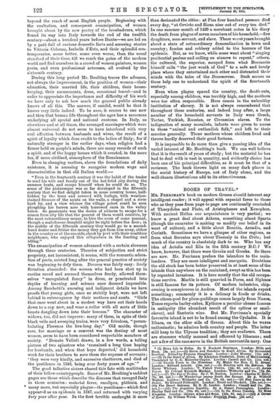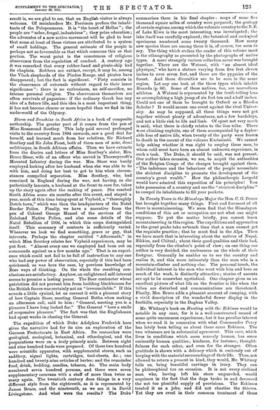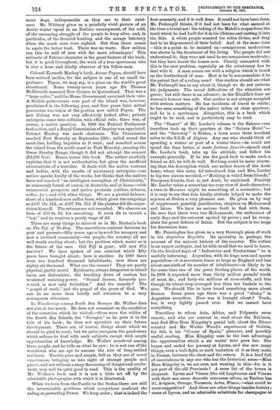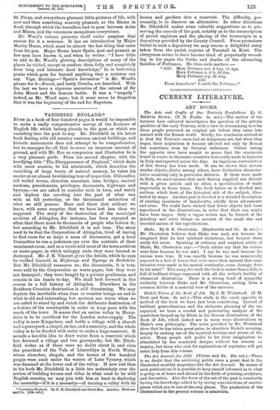BOOKS OF TRAVEL.*
Ma. FERRI/IAN'S book on modern Greece should interest any intelligent reader ; it will appeal with especial force to those who as they pass from page to page are continually reminded of Thucydides and Plato, of Aristophanes and Xenophon. With ancient Hellas our acquaintance is very partial; we know a great deal about Athens, something about Sparta (though the excavator is making us modify our belief in its want of culture), and a little about Boeotia, Arcadia, and Corinth. Sometimes we have a glimpse of other regions, as from what Socrates says about Thessaly in the Crito ; but much of the country is absolutely dark to us. Who has any idea of Aetolia and Ella in the fifth century B.C. We know, however, that there were Greeks and Greeks. So there are now. Mr. Ferriman prefers the islanders to the main- landers. They are more intelligent and energetic. Doubtless the old stock has been better preserved in at least some of the islands than anywhere on the mainland, swept as this has been by repeated invasions. It is here mostly that the old occupa. tions survive. Marble is still quarried in Faros, and Siphnos is still famous for its potters. Of modern industries, ship. owning is conspicuous in Andros. Most of the islands export something ; commonly it is a delicacy in foods or drinks. The citron-peel for plum-puddings comes largely from Naxos, Tenos exports barley-cakes, Kythnos a peculiar cheese famous in antiquity (the abundant result of the cytisus or snail- clover), and Santorin wine. But Mr. Ferriman's specially favourite island is not to be found among the Cyclades. It is Ithaca, on the other side of Greece. About this he waxes enthusiastic ; he admires both country and people. The latter still keep to the Ulysses tradition; they are seafarers. There are steamers wholly manned and officered by Ithacazus ; and not a few of the race serve in the British mercantile navy. One • (1) Homo Life in Hellas. By Z. Duckett Ferriman. London: Mills and Boon. [8e. net.]—(2) Storm and Sunshine in South Africa, By Rosamund Southey. Edited by Frances Slaughter. London: John Murray. [12s. net.] —(3) In the Heart of Africa. By Adolphus Frederick, Duke of Mecklenberg. Translated by G. E. Maberley-Oppler. London: Cassell and Co. [15s. net.] —(4) Twenty Years in the Himalaya. By Major the Hon. C. G. Bruce. London Edward Arnold. [16a. net.]—(5) Hunting with the Eskimos. By Harry Whitney. London: T. Fisher Unwin. [12s. 6d. net.]—(6) Across Papua. By Colonel Kenneth Mackay. London: Withorby and co. pa. ed. net.]—(7) The Fiji of To-Day. By J. W. Burton. London : Charles H. Kelly. re. 6d. net.]—(8) Wanderings among South Sea Savages. By A. Wilfred Walker. London Witherby and Co. [7s. 6d. net.)—(3) Five Years in 'de Sudan. By Edward Fothergill. London : Hurst and Blackett. [IS.. net.]— (10) The Desert Gateway. By B. H. Leeder. London : Cassell and Co. [611. net.]--(11) The Argentine Republic. By A. Stuart Pennington, London: Stanley Paul and Co. [103. 6d. net.]—(12) In the Rhone Country. By Bose Kingsley. London: George Allen and Bons. flOs. 6d. net.]—(13) A 047116117 of Spain. By William Wood. Londen: Delkit& Oa. wt.]
result is, we are glad to see, that an English visitor is always welcome. Of mainlanders Mr. Ferriman prefers the inhabi- tants of the Peloponnesus. It is "the heart of Hellas " ; the people are "sober, frugal, industrious"; they prize education ; the advocates of a now active movement will be glad to hear that some at least of these virtues are attributed to a system of small holdings. The general estimate of the people is perhaps not so favourable as that which concerns this or that portion. The worst point is the remoteness of religious observance from the regulation of conduct. A century ago it was remarked that every robber-band and pirate-ship had its chaplain. Robbers are extinct, except, it may be, among the Vlach shepherds of the Pindus Range, and pirates have disappeared ; but the fact is significant. "Piety consists in the observance of externals without regard to their inner significance ": there is no enthusiasm, no self-sacrifice, no intense personal religion. The observances themselves are often survivals of paganism: if the ordinary Greek has any idea of a future life, and this idea is a most important thing, it has not become clearer or more hopeful than we find in the underworld of the Odyssey.
Storm and Sunshine in South Africa is a book of composite authorship. The greater part of it comes from the pen of Miss Rosamund Southey. This lady paid several prolonged visits to the country from 1894 onwards, saw a good deal for herself, and learned much from her relatives, Sir Richard Southey and Sir John Frost, both of them men of note, domi militiaegue, in South African affairs. Then we have extracts from the diaries and letters of Miss Sonthey's sister, Mrs. Bruce Steer, wife of an officer who served in Thorneycroft's Mounted Infantry during the war. Mrs. Steer was busily employed looking after her husband when she was able to be with him, and doing her best to get to him when circum- stances compelled separation. Miss Southey, who, had remained in England during the war, not having, as she pathetically laments, a husband at the front to care for, takes up the story again after the making of peace. She reached South Africa some six months after this event, and stayed a year, much of this time being spent at Vryheid, a "thoroughly Dutch town," which was then the headquarters of the Natal Border Police. Finally, we have a narrative from the pen of Colonel George Mansel of the services of the Zululand Native Police, and also some details of the Natal Rebellion of 1906, in which this corps distinguished itself. This summary of contents is sufficiently varied. Wherever we look we find something, grave or gay, that interests. Perhaps the chapter entitled "Aftermath," in which Miss Southey relates her Vryheid experiences, may be put first. "Almost every one we employed had been out on commando against us a few months ago." That is an experi- ence which could not fail to be full of instruction to any one who had any power of observation, especially if this had been quickened, as was here the case, by previous knowledge of Boer ways of thinking. On the whole the resulting con- clusions are satisfactory. Anyhow, an enlightened self-interest seems to promise a lasting peace. The Boer contractor whose patriotism did not prevent him from building blockhouses for the British forces was certainly not an "irreconcilable?' If this sounds a little cynical, let us correct it with a pleasant story of how Captain Steer, meeting General Botha when making an afternoon call, said to him : "General, meeting you is a pleasure I have long looked for." The General "bore a smile of responsive pleasure." The fact was that the Englishman had spent weeks in chasing the General.
The expedition of which Duke Adolphus Frederick here gives the narrative had for its aim an exploration of the German Protectorate in East Africa. Its researches were geological, zoological, botanical, and ethnological, and the preparations were on a truly princely scale. Between eight and nine hundred loads were prepared. Of these two hundred were scientific apparatus, with supplemental stores, such as saddlery, signal lights, cartridges, tool-chests, &c. ; one hundred and twenty-nine articles of barter; and the remainder food, drink, bedding, candles, tobacco, &c. The main body numbered seven hundred persons, and there were seven supplementary caravans with a staff of more than twice as many again. The twentieth century does things in a very different style from the eighteenth, as it is represented by James Bruce, and the nineteenth, as we see it in David Livingstone. And what were the results ? The Duke summarises them in his final chapter : maps of some five thousand square miles of country were prepared ; the geology of certain regions, among which the volcanic country to the N.E. of Lake Kiwn is the most interesting, was investigated ; the lake itself was carefully explored; the botanical and zoological specimens numbered some twenty thousand. How many new species there are among these it is, of course, too soon to say. The thing which strikes the reader of this volume most is the ethnography as presented by the photographs of native types. A more strangely various collection never was brought together. There are the Watussi, with "an almost ideal physique," who have a stature varying from five feet eleven inches to over seven feet, and there are the pygmies of the forest. And these diversities are to be seen in the same region. Let any one look at the three types which inhabit Ruanda (p. 66). Some of these natives, too, are marvellous athletes. A Watussi is represented by the truth-telling lens as accomplishing a high jump of six feet ten and a half inches. Could not one of them be brought to Oxford as a Rhodes Scholar ? It would secure one event against the rival Univer- sity. As may be supposed, all these things were not got together without plenty of adventures, not a few hardships, and not a little risk to life and limb. Of sport not very much is said; what there is chiefly relates to the lion tribe. There were climbing exploits, one of them accompanied by a deplor- able loss of native life, when twenty of the party were frozen to death in the ascent of the volcano Karissimbi. We cannot help asking whether it was right to employ these men, to whom cold must have been an almost unknown experience, in such a task. The Duke, it should be said, was not present. Our author takes occasion, we see, to acquit the authorities of the Belgian Congo of the charges brought against them. "The indolence and the behaviour of the people necessitate the strictest discipline to promote the development of the country's great wealth." How the philanthropic Leopold would have admired this exposition of his principles! You take possession of a country and use the "strictest discipline" to compel its inhabitants to fill your pockets.
In Twenty Years in the Himalaya Major the Hon. C. G. Bruce has brought together many things. First and foremost of all there is mountaineering. We soon find that the Himalayan conditions of this art or occupation are not what one might suppose. To put the matter briefly, you cannot learn mountaineering in this region. The expeditions and approaches to the great peaks take so•much time that a man cannot get the requisite practice ; that he must find in the Alps. Then we have much that is interesting about the natives of Nepal, Sikkim, and Chitral; about their good qualities and their bad, especially from the climber's point of view ; on one thing our author is very decided, the uselessness on the whole of their footgear. Generally he enables us to see the country and realise it, and this more intimately than the man who is a mountain-climber and nothing else. The personal touch, the individual interest in the men who went with him and bore so much of the work, is distinctly attractive ; stories of ascents are apt to be somewhat egotisticaL One chapter gives us an excellent picture of what life on the frontier is like when the tribes are disturbed and communications are threatened. Finally, Mrs. Bruce adds a pleasant account of camping, with a vivid description of the wonderful flower display in the foothills, especially in the Daghan Valley.
Mr. Whitney's book on Hunting with the Eskimos would be notable in any case, for it is a well-constructed record of some quite uncommon experiences ; but it has peculiar interest when we read it in connexion with what Commander Peary has lately been telling us about these same Eskimos. The two witnesses are in substantial agreement. This race, which lives in conditions which seem scarcely human, has some eminently human qualities ; kindness, for instance, thought- fulness for each other, and even for the stranger. Often gratitude is shown with a delicacy which is curiously out of keeping with the material surroundings of their life. Thus, not allowed to return a present in kind, they would, Mr. Whitney tells us, bring beautiful carvings in ivory. They can be philosophical too on occasion. It is not every civilised man who, having left his store unguarded, would acquiesce in the fact that the dogs broke in and devoured the not too plentiful supply of provisions. The Eskimos treated it as a joke, and did not chastise the thieves. Yet they are cruel in their common treatment of these
same dogs, indispensable as they are to their exist- ence. Mr. Whitney gives us a painfully vivid picture of an Arctic winter spent in an Eskimo encampment, of the cold, of the unceasing struggle of the people to keep alive, and, in particular, of the frenzied hunting, and the savage butchery when the musk oxen were sighted. But then there comes in again the better trait. There was no waste. How seldom can this be said of men with far more advantages! This estimate of Eskimo character is the great feature of the book; but it is good throughout, the work of a true sportsman who is also a keen and kindly observer of his fellow-men.
Colonel Kenneth Mackay's book, Across Papua, should have been noticed earlier, for the subject is one of no small im- portance. Papua, we may say, is a piece on the world's great chessboard. Some twenty-seven years ago Sir Thomas Mellwraith annexed New Guinea to Queensland. That was a "large order," and the Home Government exercised their veto. A British protectorate over part of the island was, however, proclaimed in the following year, and four years later actual possession was taken of the portion now called Papua. The new Colony was not very effectively looked after ; private enterprise came into collision with official rule; there was, of course, a native question. In 1906 the Federal Parliament took action, and a Royal Commission of Inquiry was appointed. Colonel Mackay was made chairman. The Commission reached Port Moresby on September 13th; sailed round the coast-line, holding inquiries as it went ; and marched across the island from the north coast to Port Moresby, crossing the Owen Stanley Range, though it did not attempt the summit (13,203 feet). Hence comes this book The author carefully explains that it is not authoritative, but gives the unofficial observations of a traveller. It deals with the native customs and habits, with the results of missionary enterprise—our author speaks kindly of the works, but thinks that the natives have not reached "an intelligent conception of Christianity," so commonly found, of course, in Australia and at home—with commercial prospects and native products (rubber, tobacco, coffee, 8ze.), and with other things. We see a partial balance- sheet of a hundred-acre coffee farm, which gives the outgoings at 2447 19s. 11d., or £197 19s. 11d, if the planter did the super- vision himself. The returns are not recorded. We observe an item of 253 6s. 8d. for recruiting. It costs £41 to recruit a "boy," and he receives a yearly wage of £3.
There are many things to interest us in Mr. Burton's book on The Fiji of To-Day. The marvellous contrast between its past and present—fifty years ago a byword for savagery and now a civilised community—the people, the country, all are well worth reading about; but the problem which meets us is the future of the race. Old Fiji is gone ; will new Fiji survive ? We have spoken of one contrast which fifty years have brought about ; here is another. In 1860 there were two hundred thousand inhabitants ; now there are eighty-six thousand. What are the causes ? They are partly physical, partly moral. Epidemics, always dangerous to island races, are destructive ; the breaking down of custom has weakened resisting-power. "Sexual license, formerly pre- vented, is now only forbidden." And the remedy ? The "gospel of work," and the gospel of the grace of God. We can do no more than briefly call attention to a very courageous utterance.
In Wanderings among South Sea Savages Mr. Walker does not aim at too much. He does not comment on the condition of the countries which he visited,—these were the wilder of the South Sea Islands, the "Savages," as he puts it in the title of his book ; he does not speculate on their future development. There are, of course, things about which we should be glad to read ; but we quite recognise the good sense which refuses to deal with such subjects except with ample opportunities of knowledge. Mr. Walker wandered among these people, and he tells us what he saw ; he is not one of the wanderers who are apt to assume the airs of long-settled residents. Travels pure and simple, full as they are of novel experiences, bringing us into eight of strange people and places, and not without a stray flavouring of danger and excite- ment, may well be quite good to read. This is the quality of Mr. Walker's book, and it is not a little set off by the admirable photographs with which it is illustrated.
When we turn from the Pacific to the Sudan there are still the interminable problems which everywhere confront the ruling or protecting Power. We keep order ; that is indeed the
first necessity, and it is well done. It could not have been done, Mr. Fothergill thinks, if it had not been for what seemed at the time a brutal act: the taking of the Mahdi's corpse from the tomb which he had built for it in his lifetime and casting it into the Nile. A whole people counted his relics divine, and they had to be dispossessed of their belief. And at the same time —this is a point to, be insisted on—conspicuous moderation was shown in the treatment of the living. The people did not understand it; they were not used to see conquerors moderate; but they have learnt the lesson now. Closely connected with this is the race problem, especially as the missionary has to deal with it. A man comes out with a religion which is based on the brotherhood of man. How is he to accommodate it to the patent fact of a ruling race P Our readers should see what Mr. Fothergill has to say about it, though we do not endorse his judgments. The moral difficulties of the situation are grave ; but still there is an advance; in the Khalifa's time no woman's honour was safe. Our author is not always occupied with serious matters. He has incidents of travel to relate; he has seen something of the native tribes at close quarters; and he is a sportsman. Altogether, this is a book which ought to be read, and is particularly easy to read.
The "Desert" of Mr. Leeder's volume is the Sahara—our travellers took up their quarters at the "Sahara Hotel "— and the " Gateway " is Biskra, a town some three hundred miles to the S.S.E. of Algiers. Any one who should think of spending a winter or part of a winter there—he could not spend the time better, si mode fortuna faverit—should read Mr. Leeder's book, take up his attitude, and follow his example generally. If he has the good luck to make such a friend as Ali, he will do well. Nothing could be more charm- ing than the description which our author draws of the Arab home, where this same All introduced him and Mrs. Leeder to hif two sisters unveiled,—"Nothing is veiled from friends," European friends, that is, not Arab, he explained. Possibly Mr. Leeder takes a somewhat too rosy view of Arab character; a turn in Morocco might be something of a corrective ; but it is easy to see that this kindly attitude helped to make the sojourn at Biskra a very pleasant one. He gives us by way of supplement, possibly justification, chapters on Mohammed and Islam. We have no serious fault to find with them. He sees that there were two Mohammeds, the enthusiast of early days and the autocrat spoiled by power; and he recog- nises the great defects of Islam. But the subject is too large for discussion here.
Mr. Pennington has given us a very thorough piece of work in his Argentine Republic. Its speciality is, perhaps, the account of the natural history of the country. The author is an expert zoologist, and he tells us all that we need to know. On the kindred topic of "Industries and Productions" he is usefully informing. Argentina, with its huge area and sparse population—it is seventeen times as large as England and has about one-sixth of its number of inhabitants—is likely to be for some time one of the great feeding-places of the world. In 1909 it exported more than thirty million pounds' worth of meat, &c., and forty-six millions of corn-stuffs, and this though its wheat crop averaged less than ten bushels to the acre. We should like to have heard something more about finance. Some years ago there was a great " slump " in Argentine securities. How was it brought about ? Trade, too, is very lightly passed over. But we cannot have everything.
Travellers to whom Asia, Africa, and Polynesia seem remote, and who are content to read about the Eskimos, may find Miss Rose Kingsley's genial talk about the Rhone country and Mr. Walter Wood's experiences of Galicia, for this is his "Corner of Spain," pleasant, and possibly useful, reading. Miss Kingsley uses to the beat advantage the opportunities which a six weeks' tour gave her. She began and ended her journey at Lyons, and she saw many things, even a bull-fight, or such imitation of it as they make in France, between the start and the return. It is a land full of associations to any one who has the historical sense—Miss Rose Kingsley is, we are sure, not wanting in this—for is it not part of the old Provincial A mere list of the towns is eloquent. Lyons and Vienne (the old Lugdunum and Vienna with their uno amiss discretis connezum odium, as Tacitus has it), Avignon, Orange, Tarascon, Arles, Nimes,—what could be more suggestive ? And there are other things besides history ; roses at Lyons, and an admirable substitute for champagne at
St. Peray, and everywhere pleasant little pictures of life, with now and then something scarcely pleasant, as the Rhone in flood, through which the travellers had to pass between Arles and Nimes, and the venomous mosquitoes everywhere.
Mr. Wood's volume presents itself under auspices that ensure for it a welcome. It has an introduction by Major Martin Hume, which must be almost the last thing that came from his pen. Major Hume knew Spain, past and present, as few men have known it, and when he writes : "I have little to add to Mr. Wood's glowing descriptions of many of the places he visited, except to confirm them fully and completely from long and intimate local knowledge," he is bestowing praise which goes far beyond anything that a reviewer can say. Vigo, Santiago—" Spain's Jerusalem" is Mr. Wood's phrase for it—Ferrol, and lastly Cornfia, are described. With the last we have a vigorous narrative of the retreat of Sir John Moore and the famous battle. It was a " tragedy " indeed, as Mr. Wood says ; but it must never be forgotten that it was the beginning of the end for Napoleon.

























































 Previous page
Previous page